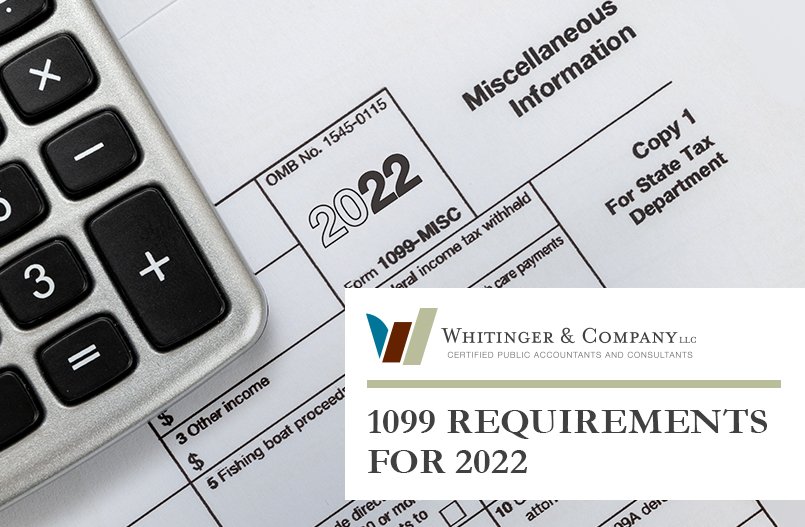1099 Requirements for 2022
The IRS requires that you file information returns (1099s) for certain payments issued by your trade or business to individuals not treated as your employees, as well as non-incorporated entities, such as partnerships and LLCs.
Common Reportable Payments Amount Requiring Reporting
| Contract labor, commissions, director fees and
other non-employee compensation………………………… Dividends, interest, and royalties…………………………………. Professional fees………………………………………………………….. Rents……………………………………………………………………………. Attorney fees for legal services…………………………………….. Payments to attorneys for settlements………………………… |
$600 or more $10 or more $600 or more $600 or more $600 or more All |
Payments to corporations are generally exempt from reporting requirements. (Payments for legal services and medical/health care payments are two of the more frequent exceptions.) You must also disclose if you made direct sales totaling $5,000 or more of consumer products on a buy-sell, deposit-commission, or other commission basis for resale by the buyer or any other person anywhere other than in a permanent retail establishment.
Deadlines
Recipient copies of 1099s should be distributed by January 31, 2023. Form 1099s, along with their respective transmittal forms (1096s), must be submitted to the Internal Revenue Service by January 31, 2023, if reporting nonemployee compensation. Otherwise, they must be submitted to the Internal Revenue Service by February 28, 2023, if filed on paper, or by March 31, 2023, if filed electronically. If you have over 250 information returns, you must file electronically. (The IRS has issued proposed regulations reducing this threshold from 250 to 10 for information returns required to be filed in 2023. Until final regulations are issued, however, the threshold remains at 250.)
For 2022, intentional disregard of the filing requirements is a penalty of at least $580 per 1099. Intentional failure to provide correct payee statements is an additional penalty of at least $580 per 1099. Improper filing and failure to file that is not intentional can also result in substantial penalties. In addition, the government has backup withholding regulations that require you to deduct and withhold income tax at a 24% rate if the payee fails to furnish an identification number to you.
Use Form W-9 at the time you pay the recipient. If they do not provide you with the information, you are required to withhold 24% of the amount due to them, which is payable to the IRS at that time. This is referred to as backup withholding. We advise you to put a procedure in place to obtain a completed W-9 from each vendor prior to issuing payment to them.
1095 Requirements for Health Coverage Reporting
Large employers (50 or more full-time equivalents) must file Form 1095-Cs with the IRS and also provide statements to full-time employees regarding health coverage the employer offered or showing that the employer did not offer coverage. Employers offering self-insured coverage must also file Form 1095-Bs, regardless of the number of employees. 1095-Bs and 1095-Cs are due to employees on or before March 2, 2023. 1095-Bs and 1095-Cs are due to the IRS on or before February 28, 2023, if filed on paper, or by March 31, 2023, if filed electronically.
Conclusion
The ideas discussed in this letter are intended to provide an overview of standard requirements and best practices but are no substitute for personalized professional assistance. Please do not hesitate to contact your Whitinger advisor to assist you in the preparation of your 1099s for 2022. To comply with the IRS deadlines, please provide the necessary information to our office by January 16, 2023.


